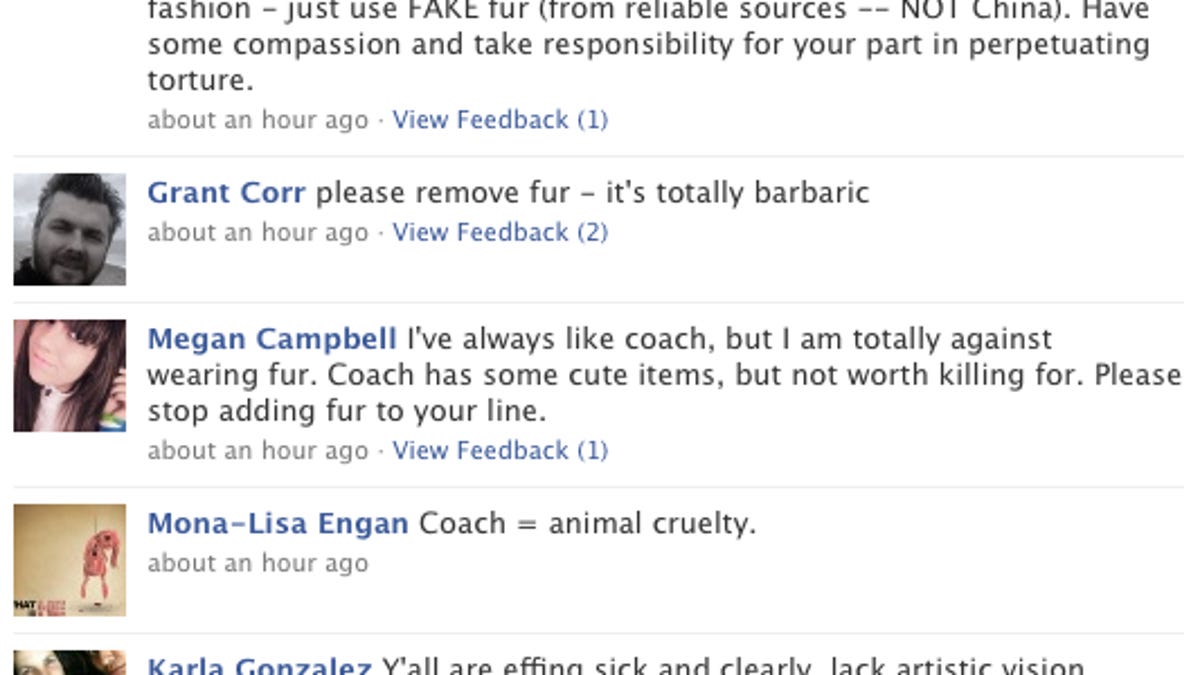Anti-fur activists flood Coach Facebook page
The leather goods company has been the subject of an ongoing campaign on behalf of PETA to stop using fur in its products, and on Thursday they took to social media.

Facebook followers of the Coach leather goods company were treated to some unpleasant imagery on Thursday when dozens of anti-fur activists flooded the Coach Facebook wall with graphic photographs of caged and skinned animals.
They were likely followers of an ongoing campaign on behalf of People for the Ethical Treatment of Animals (PETA), which is well-known for heavy shock value in an attempt to get its message across (as well as its sometime affinity for robot groundhogs), to convince Coach to dump fur products.
Coach has more than 1 million Facebook fans--as far as luxury brands go, it's been particularly active in turning to social media like Facebook and Twitter as new marketing channels--so there's a chance that some of them were seeing the posts turn up on their Facebook home pages in addition to the Coach page itself. It's a tactic similar to one earlier this year in which environmental activists spurred by Greenpeace took to chocolate manufacturer Nestle's Facebook page to convince it to stop the harvest of palm oil in vulnerable rainforest ecosystems. That backfired when Nestle began removing some critical posts from Facebook users who had changed their profile pictures to a modified version of Nestle's logo--and when the Nestle page administrator lashed out in the comments.
Likewise, the complication for Coach in this situation is how to deal with it. Delete too much and it could be assailed for censorship or whitewashing; leave critical posts intact and brand value can take a hit. An administrator of Coach's Facebook page began removing the wall posts with photographs, but appeared to be leaving intact many of the posts that were simply criticizing the company for its use of animal fur. Coach has structured its Facebook fan page so that, upon loading its "wall," only official Coach posts appear first. Visitors to the page can click through to see the posts that registered fans have made.
Coach head of media relations Andrea Resnick told CNET that she could not comment on the company's strategy for dealing with the Facebook campaign, instead highlighting a September 24 proxy statement in response to a proposal that PETA, which has purchased Coach stock, sent to the company.
"Despite the broad industry movement away from using animal fur, the technological advances in producing luxurious synthetics, and the cruelty inherent in fur production, Coach has refused to go fur-free," the letter explained, citing a number of other apparel and accessory brands like Gap and Kate Spade that have stated that they do not or no longer use fur in their products. "This is a matter of significant social importance, and understanding the feasibility of Coach joining many other retailers in becoming fur-free would benefit shareholders."
PETA would likely also hope that Coach would go leather-free, but reasonably seems to realize that convincing a leather goods company to give up leather may be too much of a stretch even for its most dedicated activists. Campaigning against fur might actually get results.
Or not: Calling the PETA proposal an "attempt to second-guess management's decisions regarding ordinary business issues, micro-manage the affairs of the company and interfere with the day-to-day conduct of our ordinary business operations," Coach recommended that its board of directors vote against it, which they subsequently did unanimously.
PETA originally announced the Coach shareholder resolution in May. It doesn't look like a Facebook campaign will have a different effect.
In the Greenpeace-Nestle situation this spring, things turned out in Greenpeace's favor. Nestle announced that it was cutting its ties to companies that harvested palm oil in ways that could contribute to deforestation.
PETA was successful earlier this year in convincing Zynga, the manufacturer of popular social game Mafia Wars, to stop using virtual pit bulls as a weapon in the game, citing the fact that it could contribute to misperception and abuse of the dogs.

